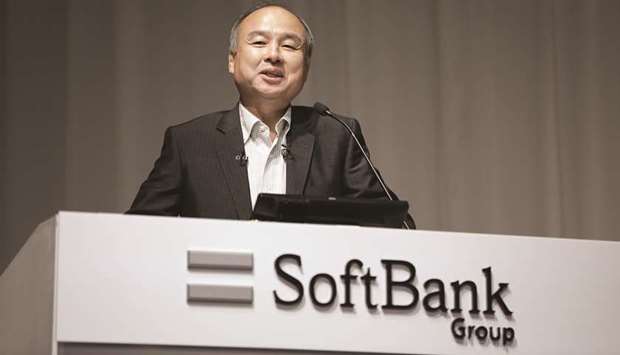SoftBank Group founder and CEO Masayoshi Son is struggling to raise money for a second massive technology investment fund in the wake of the failed public offering of office-rental company WeWork and sliding valuations of other major investments, according to two people familiar with the situation.
Son is still determined to go ahead with Vision Fund 2 even though some lieutenants have urged a delay, the two people with knowledge of SoftBank’s internal discussions told Reuters.
But it is likely to be far smaller, at least at the outset, than the $108bn that SoftBank said it had lined up when it announced the fund in July, these people said.
Major investors have yet to sign on, leaving a $38bn pledge from publicly traded SoftBank Group itself as the only large commitment, according to the sources.
And the size of that pledge may itself be in doubt given some of the recent investment setbacks it has suffered and the lack of available cash on its balance sheet, according to a Reuters analysis.
Vision Fund and SoftBank Group declined to comment on the progress of Vision Fund 2.
The implosion in the valuation of WeWork and questions about its business model have dented Son’s reputation as a savvy investor and point to a big writedown by the first Vision Fund. SoftBank and the Vision Fund together poured more than $10bn into the company, investing some of that at a valuation of $47bn in January.
But WeWork recently abandoned plans for an initial public offering that would have pegged the company’s worth at just $10bn-$12bn. If the second fund comes in well short of Son’s goal or gets scrapped it will have broad implications for Silicon Valley venture capitalists, entrepreneurs and Wall Street financiers.
The first Vision Fund, which raised $97bn, upended the tech investing world with massive bets on fast-growing but unproven companies. It was bigger than the aggregate amount raised by the entire US venture capital industry in 2018, giving Son a massive influence over the start-up market.
Sceptics say the troubles at WeWork and the poor public market performance of money-losing companies such as Uber Technologies Inc and Slack Technologies Inc will trigger a big decline in the value of numerous so-called “unicorn” startups worth more than a billion dollars.
“The radiation is spreading everywhere,” said Scott Galloway, an author and one-time entrepreneur who teaches at New York University and who has been closely following the WeWork turmoil.
To be sure, there are investments in the 80-plus companies Vision Fund has financed that appear to be paying off quickly.
Delivery company DoorDash, for one, has rocketed in value, at least on paper, from $1.4bn last March to $12.6bn in May.
SoftBank, which owns about a third of the Vision Fund, in July reported a 62% return on its investment, including management and performance fees.
Son also has a track record of big scores: the $20mn he put into China’s Alibaba Group Holdings in 2000 is now worth more than $100bn, for example.
Most analysts rate SoftBank Group a buy and say it still has borrowing capacity, and its majority-owned telecom and internet media unit throws off healthy profits.
Debt piles up
Back in July, SoftBank said a group of companies, including technology behemoths Apple Inc and Microsoft Corp, as well as a slew of Japanese banks, and Britain’s Standard Chartered Plc would contribute to Vision Fund 2. But it is unclear how firm those commitments are, and none of the corporate investors have a track record of making multi-billion-dollar commitments to an outside venture fund. Microsoft, Apple and Standard Chartered declined to comment. The Japanese institutions are mostly contributing only small amounts, sources familiar with the matter said.
At least one financial investor is planning to make loans to the fund rather than contribute cash.
Japanese investment bank Nomura Holdings Inc, which was lead underwriter for the IPO of SoftBank’s telecom unit, has decided not to put money into the new fund, according to a source familiar with its plans.
Nomura declined to comment.
Saudi Arabia’s Public Investment Fund (PIF), which contributed $45bn to the first Vision Fund, does not have large amounts of fresh cash to invest until it receives payment from a pending asset sale or proceeds from the planned public offering of the oil firm Aramco, according to people familiar with its finances.
The Aramco offering is long delayed and there is no guarantee it will go ahead even next year.
The United Arab Emirates’ Mubadala fund still intends to invest in Vision Fund 2 but is seeking more say in the investments, a source familiar with the discussions said.
“Our rights to weigh in on investments are of course part of the consideration as we assess Vision Fund 2,” a spokesman for Mubadala said.

Masayoshi Son, chairman and chief executive officer of SoftBank Group Corp, reacts during a news conference in Tokyo. Son is struggling to raise money for a second massive technology investment fund in the wake of the failed public offering of office-rental company WeWork and sliding valuations of other major investments, according to two people familiar with the situation.
